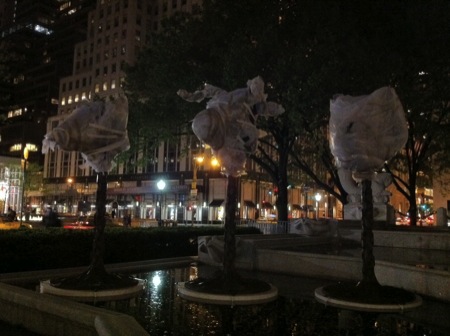|
||||||||||
|
ARTICLESA View on Ai Weiwei's ExitGeremie R. Barmé*
On 22 June 2011, as this issue of China Heritage Quarterly was being prepared for publication, news came from Beijing that Ai Weiwei 艾未未 had been released from police custody. As the noted expert on Chinese legal practices Jerry Cohen pointed out, the release came in the form of qubao houshen (取保候审 'obtaining a guarantee pending trial'), which, Cohen noted, 'commonly referred to in English as "bail" despite substantial conceptual and procedural differences.'[1] From the time of Ai's detention at Beijing Airport in early April 2011, Chinese officialdom maintained that police had taken the artist as part of an investigation into suspected tax evasion. Despite such formalistic statements (and one particularly risible remark by a government spokesperson that Ai could not expect to 'hide behind the law'), the Beijing propagandists allowed for a range of grotesque 'charges' and vilifications to be aired in the Communist-friendly press in Hong Kong. As is pointed out below, such attacks were substantially political in nature. Over the coming months one presumes that the farrago related to Ai's detention and persecution will continue. There will be po-faced rejections of any suggestions that the Chinese authorities had taken heed of international outrage at Ai's disappearance; aspersions will also be cast on those who have the temerity to suggest that the Communist authorities were availing themselves of tax law to silence an outspoken critic at a time of Jasmine-revolution-inspired anxiety. By the same token, many in China and abroad who have found Ai to be a nuisance to the usually happy commerce between money and art will cheerfully denigrate the artist as an 'economic criminal', absolving thereby the Chinese party-state of its egregious behaviour. For his part Weiwei has been taught a lesson that, given his family history and his long-term personal observations, barely needed repeating. The authorities had also made the point of detaining the artist's assistants (although they were being released around the time of Weiwei's 'bail out'). The aim of the exercise—enforced silence, a lesson in terror and a warning to China's broader cultural community—was achieved, but at considerable cost. Hardliners in China will be outraged that this dissenting figure has been treated so leniently; while the liberal minded will take comfort in the fact that the party leaders, even at their most arrogant, still train a gimlet eye on international opinion. Weiwei has been told to keep his tweets and blogs to himself and, in the short run at least, he knows that circumspection may be the better part of valour (for a selection from his earlier blogposts, see Features in this issue of China Heritage Quarterly). After all, over the ages many men and women have learnt to their regret and misfortune that '欲加之罪何患无辞' (yu jia zhi zui, he huan wu ci, a crime can always be found to fit the punishment)—this hoary (and still commonplace) saying in China comes from the pre-Qin historical text, Zuo Zhuan. See《左傳·僖公十年》:'不有廢也,君何以興?欲加之罪,其無辭乎?'. In the Legalist environment of China today, few doubt the malleability of the country's burgeoning corpus of laws. A much shorter version of the following essay was originally destined for a leading North American newspaper outlet. Unfortunately, so much editorial 'back-filling' was required to transform it into something more accessible to even a relatively sophisticated readership, I decided that it would be best to pull it. Instead, it was first published by China Beat on 27 April 2011.[2] The essay was written on the eve of the 2 May unveiling by New York City and the arts group AW Asia of Ai Weiwei's 'Circle of Animals/Zodiac Heads' at the Pulitzer Fountain, Grand Army Plaza (located at the south-east corner of Central Park). That sculptural work is the artist's over-sized comment on the controversy surrounding the auctioning of two of the twelve bronze 'Zodiac Heads' plundered in 1860 from the Garden of Perfect Brightness (Yuanming Yuan 圓明園, which is generally, although erroneously, referred to as the 'Old Summer Palace'), the Qing-era garden palace to the northwest of Beijing. As Weiwei said of his reinterpretation of the original bronze heads: My work is always dealing with real or fake, authenticity, what the value is, and how the value relates to current political and social understandings and misunderstandings. I think there's a strong humorous aspect there. The [Yves Saint-Laurent] zodiac auction [in February 2009] really complicated the issues about art, about the real, about fake, resources, looting, about the appreciation of objects—all these kinds of issues.[3] In the event, as an Australian writing about Ai Weiwei and the broader context of his detention at this time, it seemed timely in another regard as our Prime Minister, Julia Gillard, was undertaking on 25-28 April 2011 her first visit to Beijing as head of government. On her arrival the PM was peremptorily cautioned by the Chinese ambassador in Canberra to be mindful of the country's 'tremendous progress' in the area of human rights. While by necessity economics dominated the state visit, as it indeed looms over the bilateral relationship, issues related to minorities, Christian groups and human rights abuses could not easily be avoided. Not surprisingly, Gillard was reassured by the Chinese Premier, Wen Jiabao, that the country was not 'taking a backward step' in these areas, despite glaring evidence to the contrary widely reported in the international media. It is also worth noting a 22 April 2011 opinion piece in the populist Beijing daily The Global Times in which the official Chinese stance, one that is repeatedly critical of former Prime Minister Kevin Rudd's stewardship of the Australia-China relationship in 2008-2010, was made quite clear: What is especially unacceptable to the Chinese people is Australia's challenging of Chinese values. The two countries are vastly different in their national situations, especially in term [sic] of population. If China has no right to make light of the Australian model, Australian should not belittle the 1.3 billion Chinese people's right to choose their own political path, either. In the particular lexicon of the party-state, 'basic respect' means support or at least tacit acceptance of even the most egregious acts of Chinese officialdom. Fortuitously, an English-language selection of Ai Weiwei's Internet writings has recently appeared, providing the general reader, as well as easily cowed foreign government officials, a first-hand account of how a major contemporary Chinese cultural figure sees the dilemmas surrounding 'basic respect' in China today.[5] A selection from this volume can be found in the Articles section of this issue of China Heritage Quarterly. We should also note that, in mid April, a major international petition addressed to the Chinese Minister of Culture on behalf of Ai Weiwei was launched by the Solomon R. Guggenheim Foundation and despite attempts by unidentified hackers to disable the host site at the time of Ai's release eighty days after his detention, some 140,000 people from 175 countries had signed the online petition.[6] One would observe that presumably to the Beijing authorities such international support merely confirms their view that Weiwei is a nefarious agent of the West, itself hell-bent on regime change and 'peaceful evolution' in China. My thanks to Lois Conner for permission to use photographs she made of the Ai Weiwei show en plein air in New York in early May 2011.—Geremie R. Barmé On 11 February 2010, in response to a question from a foreign journalist the Chinese Foreign Ministry spokesman Ma Zhaoxu observed: 'There are no dissidents in China.' This came only hours after a Beijing court had quashed an appeal by Liu Xiaobo, the democracy advocate who had been jailed for eleven-years on charges of 'subverting the state.' The charges related to his involvement in the Charter 08 petition movement.[7] Asked to elaborate, Ma said: 'In China, you can judge yourself whether such a group exists. But I believe this term is questionable.' 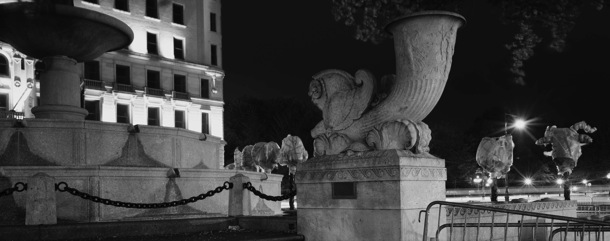 Fig.1 Ai Weiwei, 'Circle of Animals/Zodiac Heads' at the Pulitzer Fountain, Grand Army Plaza, Manhattan, New York. (Photograph: Lois Conner)
Shortly after the People's Republic was declared a 'dissident-free country,' the artist and cultural blogger Ai Weiwei offered his analysis of Chinese-style doublethink via Twitter: Foreign Affairs Ma's statement contains a number of layers of meaning: 1. Dissidents are criminals; 2. Only criminals have dissenting views; 3. The distinction between criminals and non-criminals is whether they have dissenting views; 4. If you think China has dissidents, you are a criminal; 5. The reason [China] has no dissidents is because they are [in fact already] criminals; 6. Does anyone have a dissenting view regarding my statement? On 3 April this year, Ai Weiwei was detained while preparing to board a flight to Hong Kong. It is claimed that he had been taken into custody on suspicion of economic crimes. Whatever that case may be, there is little doubt that the Chinese party-state had finally decided to silence its most outspoken free-range dissident. 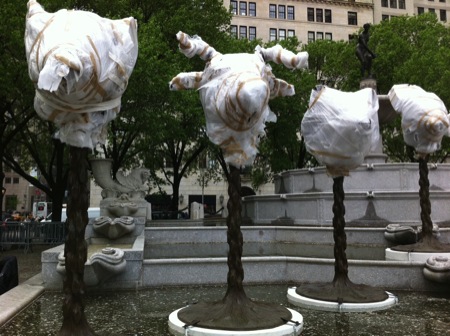 Fig.2 Ai Weiwei, 'Circle of Animals/Zodiac Heads' at the Pulitzer Fountain, Grand Army Plaza, Manhattan, New York. (Photograph: Lois Conner) For some years observers have marveled at what for official China was extraordinary leniency towards Weiwei's increasingly provocative behavior and statements. In a sense, from 2008, he became a one-man work of dissenting performance art (although the harassed popular activists, lawyers, journalists, academics, aggrieved citizens, Christians and NGO figures subject to what has since become the worst period of repression since 1989 are never far from mind). Many have enjoyed the spectacle; others have dreaded the reckoning. In the end, there were rumors that amidst the police provocation and escalating bullying, the authorities had also essayed a softer, tried-and-true formula, one that had worked with so many other disaffected members of the élite over the years: they are said to have offered Ai Weiwei membership in the National Committee of the Chinese People's Political Consultative Conference. After all, if he wanted to seek redress for injustices or to raise his voice in protest, where better than within the capacious tent created by the party in the 1950s? The NCCPPCC was after all a broad, if impuissant, church that had become the last refuge for so many of the thinking men and women of China who had initially been lured to support the party in the 1940s only to suffer betrayal subsequently. It also offers impotent status to numerous other cultural and business worthies today. Someone must have thought it was a perfect fit for Weiwei. When the artist rejected this final, and to the bureaucratic mind, magnanimous gesture, however, and given the atmosphere of alarm generated by events in the Middle East, conciliation necessarily gave way to confrontation. Although known to cognoscenti of China's alternative cultural scene from the late 1970s, Weiwei shot both to local and to international prominence for his role as a design consultant to the Swiss architects of Beijing's 'Bird's Nest' National Stadium, the main site of the 2008 Olympics. Although his role in that project was lauded by the authorities, at the same time, for the years around China's Olympic moment, Weiwei, in what have been described as Internet 'rants', recorded his mounting outrage at the glaring clash between his country's avowed new openness and the party-state's old repressive, corrupt and mendacious ways. Like so many before him, he well knew that the price for candour would be high. In a blog-post dated 13 April 2009, for instance, he wrote: 'The truth is always terrible, unfit for presentation, unspeakable, and difficult for the people to handle, just speaking the truth would be "subversion of the state".'[8] 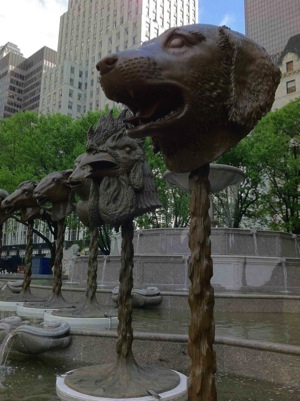 Fig.3 Ai Weiwei, 'Circle of Animals/Zodiac Heads' at the Pulitzer Fountain, Grand Army Plaza, Manhattan, New York. (Photograph: Lois Conner) Some commentators have remarked that the relentless appetite of the international media for China controversy in recent years served to goad Weiwei into making ever more extreme statements, ones that would lead to the same place that outspokenness has guided so many others before him: jail. All the while his words were not easily accessible in China itself, where despite often extraordinary official toleration he was regarded as being too much of a firebrand, or rather as a noxious figure who contributed to upsetting the chummy relationship between power, commerce and global capital. It is now virtually de rigueur for writers to hedge their remarks about prickly individuals like Weiwei and their plangent fate with the balm of happier observations to do with general overall improvements in China, its relatively flourishing intellectual scene, the lot of the common man and woman, and so on and so forth. But it is too easy to take Weiwei's splenetic rants as constituting his only message, for him to be out of kilter with the times, a distasteful (if colourful) irritant to 'business as usual', or indeed to regard international readers as his predominant audience. Rather Weiwei has been very much a Chinese critic, addressing internal concerns but speaking far beyond the borders of the party-state. In fact, he belongs to a long line of modern Chinese thinkers and cultural figures whose moral outrage in the face of tyranny has taken the form of lambast, irony or biting satire. Lu Xun 鲁迅 (d.1936) is the most famous in this lineage, but their number also includes the early Republican journalist Huang Yuansheng 黃遠生 (murdered in 1915), the High-Maoist era journalist Deng Tuo 鄧拓 (committed suicide in 1966), the middle school student Yu Luoke 遇羅克 (executed in the early 1970s), the Taiwan-based writers Bo Yang 柏楊 and Li Ao 李傲, the Hong Kong humorists Hah Kung 哈公 and Yau-ma-tei 尤馬蒂, the essayist Lung Ying-tai 龍應台 (recently banned in China), the journalist Dai Qing 戴晴 (censored since 1989), the novelist Chan Koon-chung 陳冠中 (banned in China), the playwright Wu Zuguang 吳祖光, a man still celebrated although his sharp criticisms are deleted from the record, and the blogger Han Han 韓寒, who still remains at large. Then, of course, there is the imprisoned Liu Xiaobo 劉曉波. 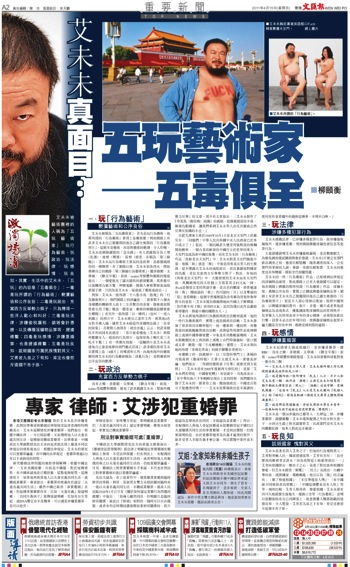 Fig.4 Liu Yiheng 柳頤衡, 'Ai Weiwei zhen mianmu: Wu wan yishujia—wu du ju quan' 艾未未真面目:五玩藝術家-五毒俱全, Hong Kong Wenhui Bao 文匯報, 15 April 2011, A2 These are but a few of China's voices of conscience; their ideas, and their fate, have not been limited to a particular Chinese polity, rather they are part of the 'Chinese commonwealth'. It is a commonwealth that has finally achieved much in material terms, but one that has repeatedly failed to realise the promise of a more equitable, free and democratic society, one championed by the Xinhai Revolution that marks its centenary this year. In the context of this century-old lineage then Ai Weiwei was treading very familiar ground when he published blog-posts during the dizzying days of the Beijing Olympics, including the following, which appeared on the last day of the Olympics, 18 August 2008: For a moment, forget the struggle between tyranny and civil rights; forget the extravagant dreams of referendums or citizen votes. We should struggle for and protect those most basic, miniscule bits of power that we truly cannot cast aside: freedom of speech and rule of law. Return basic rights to the people, endow society with basic dignity, and only then can we have confidence and take responsibility, and thus face our collective difficulties. Only rule of law can make the game equal, and only when it is equal can people's participation possibly be extraordinary.[9] For its part the Chinese press has been unequivocal in stating why this gadfly artist has been disappeared now, despite the nebulous talk in Beijing about his 'economic malfeasance.' In an article published under the name Liu Yiheng that appeared in the Hong Kong version of the official mainland daily Wenhui Bao on 15 April, Weiwei is denounced for 'five poisons.' These are: 1. Contempt for art and public decency; 2. Allowing himself to become a tool of the West's anti-China machinations; 3. Flouting of numerous laws; 4. Being a suspected bigamist; and, 5. For insulting the nation.[10] The attack was written in the cloacal prose so favoured by party hacks since the early Maoist days of the 1940s—a style that combines the diction of the guttersnipe with a posture of high dudgeon. The nub of the matter, the article avers, is that for years Weiwei has been producing 'art that confounds the boundary between the artistic and the political; in fact, he uses it to engage in political activities.' The author then sums up Ai's crime du jour: 'During the recent unrest in the Middle East he actively encouraged local protesters and has intimate links with those who are plotting a "Jasmine Revolution" in China itself.' The article was accompanied by a photographic work by the artist featuring Ai Weiwei standing in front of Tiananmen Gate with the English word 'FUCK' stencilled in red on his bare chest. 'Not only does this reflect the hooligan nature of Ai as a person,' the denunciation claims, 'it reveals his contempt for our nation, evidence that he is a pawn in the anti-Chinese machinations of the West.' After deliciously listing Chinese dialectical variations of the word 'fuck' the author quotes Ai on why he decided to employ an English rather than a Chinese term: 'I'm offering this to foreign friends who understand the word and who love China.'[11] 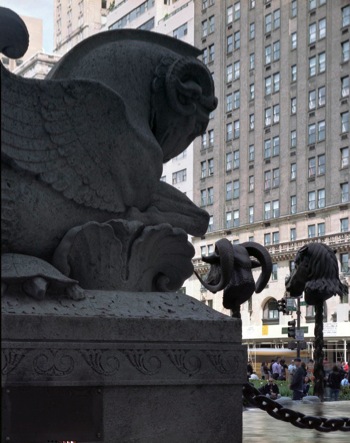 Fig.5 Ai Weiwei, 'Circle of Animals/Zodiac Heads' at the Pulitzer Fountain, Grand Army Plaza, Manhattan, New York. (Photograph: Lois Conner) The attack ends with a reminder that the artist's long-dead father was the famous patriotic poet Ai Qing. The poet's son, however, 'insults the Chinese nation, shows contempt for the state and is inciting rebellion.' The official Chinese media can always be relied on to outstrip the irony of even the most pointed critic: One of the things that forced Weiwei into open rebellion against the government was his fury at the repression of popular protests over the death of thousands of children in the Wenchuan Earthquake of April 2008 due to shoddy school-building construction. The faux-official commentator ignores this and concludes that only days after the earthquake Ai Weiwei had posted a performance art piece that featured oral sex. 'His brazen contempt for basic moral decency is horrifying,' comes the rebuke. 'If Ai Qing knew of this in the afterlife he would surely rebuke this unfilial son.' I first met Ai Qing in late 1978, shortly after the family had been brought back from decades of internal exile. I was introduced to them by a mutual friend, the translator Gladys Yang. Gladys knew of my interest in Chinese literary history and the fate suffered by dissenting Chinese writers under the Communists. In particular there was the 1942 purge in Yan'an when Mao condemned arrant writers like Ai Qing 艾青, Ding Ling 丁玲 and Wang Shiwei 王實味 for their criticisms of party corruption and privilege. As the tough-talking army man Wang Zhen 王震 put it at the time (much to Mao's approval): 'Our comrades are shedding blood and dying on the front line for the party and the People of China, while you're eating your fill and attacking the party in safety' (qianfangde tongzhi wei dang wei quanguo renmin liuxie xisheng, nimen zai houfang chibaofan ma dang 前方的同志为党为全国人民流血牺牲,你们在后方吃饱饭骂党). Accused of threatening the party's unity all three were detained. After a harrowing, often violent, re-education campaign Ai and Ding were 'rescued'. They had recognized the follies of their ways and were subject to the party's munificence. Wang Shiwei, however, condemned as a Trotskyite and a KMT spy was beheaded in 1947. After his second rehabilitation in the late 1970s (he fell foul of the authorities again in 1957), Ai Qing would be lauded as a great poet, a patriot and a faithful party man. But during our first meeting in 1978 it was obvious that both he and his wife, Gao Ying 高英, were profoundly shell-shocked. The Cultural Revolution was not long over and de-Maoification was only just starting in earnest. As Gladys and I got up to leave he gave me a copy of a new poem entitled 'Living Fossils' (Huo huashi 活化石). With a grin he said, 'This is autobiographical.' It was about a gambolling fish caught up in a sudden cataclysm. Discovered millions of years later it looked as vital as the day on which it had been buried alive. 'But you are silent, breathless,/… Faced with this fossil/ any fool can see:/ We cannot live unless we can move./ To live is to struggle, /to advance/ We must expend our all/ Before the advance of death' ( 但你是沉默的,/连叹息也没有… 凝视着一片化石,/傻瓜也得到教训:/离开了运动,/就没有生命。/活着就要斗争,/在斗争中前进,/当死亡没有来临,/把能量发挥干净。) The sentiment behind that poem is worth recalling now that Ai Qing's son, Weiwei, has been immobilized. Idiosyncratic and highly individualistic, influenced by a youth spent in the company of his exiled parents and long years in New York, Weiwei is also part of a unique generation. The men and women of that generation were witness to the hysterical rise and the ignominious failure of the political ideals of the Mao era; it's a generation that has been at the forefront of the inventive changes that have created China's miracle, and have laid the foundations for its future potential. 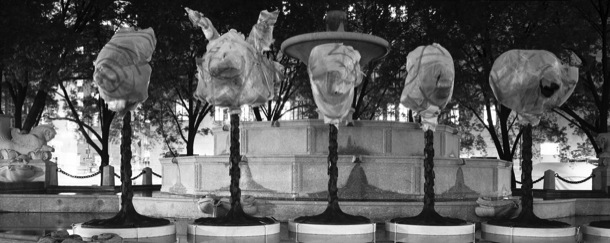 Fig.6 Ai Weiwei, 'Circle of Animals/Zodiac Heads' at the Pulitzer Fountain, Grand Army Plaza, Manhattan, New York. (Photograph: Lois Conner)
Of the artistic avant-garde that developed from the 70s but gained international recognition only from the 1990s, few like Ai Weiwei have maintained the bond between creativity and arrant opinion. Many have absorbed the lessons of the repeated political campaigns of the 1980s, and have learnt well the rules of China's 'velvet prison', one which offers generous rewards to those who master the canny art of post-socialist survival. Today, a majority of the celebrated stars of the Chinese arts are complicit in the party-state enterprise that permits them a measure of artistic license as well as boundless freedom to make money. It is a formula that works well too for foreign investors, governments and cultural bodies alike. But increasingly, Ai Weiwei and a few other bold individuals confound this comfortable arrangement. They offer words of caution in an age of exuberance, theirs are voices of possibility that draw on the past, as well as the present, to speak to China's future, or at least they pinpoint today the hazards that block the way ahead. Many—and not just the authorities—would prefer them silenced, if not merely for the sake of political expediency, then because their existence pricks the conscience of those who have learnt how to accommodate themselves to China's regnant harmony. One of the few to have spoken out was somebody who assumed the identity of the immensely popular Shanghai-based blogger Han Han. On 14 April, this hoaxster released a blog-post entitled 'Good-bye, Ai Weiwei!' Needless to say, it was soon 'harmonized' from the mainland Chinese Internet. In that short essay 'the impostor' speaks of his sorrow at hearing the news of Weiwei's demise. Among other things he declares: I don't want to make any more appeals; nor do I have the energy to call for anything. Starting from the founding of this dynasty in 1949: the Anti-Rightist Movement, the Cultural Revolution, the Strike Hard Campaigns, the Student Movement, the Campaign to Maintain Stability… in each and every one of these periods countless people of conscience have been jailed, and countless individuals of conscience have been executed. Why is the Five-Star Red Flag so very red? That's because it's soaked in the fresh blood of countless men and women of conscience. Ai Weiwei's denouement would have been long contemplated and carefully considered by the authorities. Its potential to generate international embarrassment and opprobrium has clearly been offset by its immediate, symbolic, and practical impact. But Ai Weiwei's exit is only a short-term solution to an intractable long-term problem: whither China? Meanwhile, it confronts the West and even the very people who claim cultural fellowship with him. For years Ai Weiwei's brazen truth-telling has been a challenge to the other prominent darlings of the international film, art and literary circuit. Will they now stand in solidarity with one of their own, even though he has repeatedly caused them discomfort? Or will they, like the hundreds of other 'transgressive' (that is, 'naughty but not dangerous') representatives of China's globally vaunted new culture, remain silent and continue to enjoy the rewards available to those who acquiesce in measured cultural repression while never having to take a stand? Related material from China Heritage Quarterly:
Notes:* For more on my views on both cultural rebellion and complicity in post-Mao China, I would direct readers to the volumes Seeds of Fire: Chinese Voices of Conscience, edited with John Minford, New York: Hill & Wang, 1988, 2nd ed.; New Ghosts, Old Dreams: Chinese Rebel Voices edited with Linda Jaivin, New York: Times Books, 1992; and, my In the Red, on contemporary Chinese culture, New York: Columbia University Press, 1999. See also my previous essays on related subjects in China Beat: 'China's Promise' (10 January 2010), at: http://www.thechinabeat.org/?p=1374; and, 'The Harmonious Evolution of Information in China' (29 January 2010), at: http://www.thechinabeat.org/?p=1422. Unless otherwise indicated, all translations in the above essay are my own. [1] In 'Jerome A. Cohen Responds to Ai Weiwei's release', a blogpost on New York University's U.S. Asia Law Institute site (http://www.usasialaw.org/?p=5581), Cohen continues: Qubao houshen (QBHS) is a technique that the public security authorities sometimes use as a face-saving device to end controversial cases that are unwise or unnecessary for them to prosecute. Often in such cases a compromise has been reached in negotiation with the suspect, as apparently it has been here. Of course, we will have to hear what Ai says upon release, recognizing that, as part of the agreement and as a consequence of long incommunicado detention, the released suspect is usually subdued in any public remarks made upon release (recall Xu Zhiyong, for example). [2] See: http://www.thechinabeat.org/?p=3371. [3] From an interview with the artist by Eugene Kan, online at: http://hypebeast.com/2011/03/ai-weiwei-circle-of-animalszodiac-heads-exhibition-pulitzer-fountain/. For further background to the 'Zodiac Heads' of the Garden of Perfect Brightness and the history, as well as the contemporary significance, of China's formerly ignored 'national ruin,' see China Heritage Quarterly, Issue 8 (December 2006), at: http://www.chinaheritagequarterly.org/editorial.php?issue=008. [4] See: 'Redefining Australia-China Ties,' online at: http://opinion.globaltimes.cn/editorial/2011-04/647470.html. [5] See Lee Ambrozy, ed., Ai Weiwei's Blog: Writings, Interviews, and Digital Rants, 2006-2009, Cambridge, Ma.: MIT Press, 2011. [6] See: http://www.change.org/petitions/call-for-the-release-of-ai-weiwei. [7] See: http://www.charter08.eu/. [8] From Ai Weiwei's Blog, p.218. [9] From Ai Weiwei's Blog, pp.181-82. [10] See, Liu Yiheng 柳頤衡, 'Ai Weiwei zhen mianmu: Wu wan yishujia—wu du ju quan' 艾未未真面目:五玩藝術家-五毒俱全, Hong Kong Wenhui Bao 文匯報, 15 April 2011, A2. Online at: http://paper.wenweipo.com/2011/04/15/PL1104150001.htm. For an extension of this kind of wretched slander, see Sha Liu's 沙柳 'Ai Weiwei qi ren qi shi' 艾未未其人其事, 23 May 2011, online at: http://sc.wenweipo.com/system/20110523/000016884.html (reprinted in Wenhui Bao from the May 2011 issue of Bauhinia Magazine 《紫荆》). [11] For students of the ribald, the original reads: 'Fuck 是個很古老的英語字彙,是出名的髒話,與普通話的「肏」、閩南語的「幹」、四川話的「日」以及粵語的「屌」意思類似。這個字普遍被認為含有極為冒犯和侮辱對方的意思。) 艾未未還奴顏媚骨地向外國主子解釋說:「為什麼不用『操』而用 FUCK,是因為僅以此作品獻給看得懂的、熱愛中國的國際友人。」' [12] From 'Zai jian! Ai Weiwei' 再见!艾未未, online at: http://www.peacehall.com/news/gb/pubvp/2011/04/201104141714.shtml. Regarding the false attribution, see Evan Osnos, 'The Han Dynasty', The New Yorker, 4 July 2011; and, Osnos, 'Han Han Funny', his 29 June 2011 Letter from China, online at: http://www.newyorker.com/online/blogs/evanosnos/2011/06/han-han-funny.html. |
